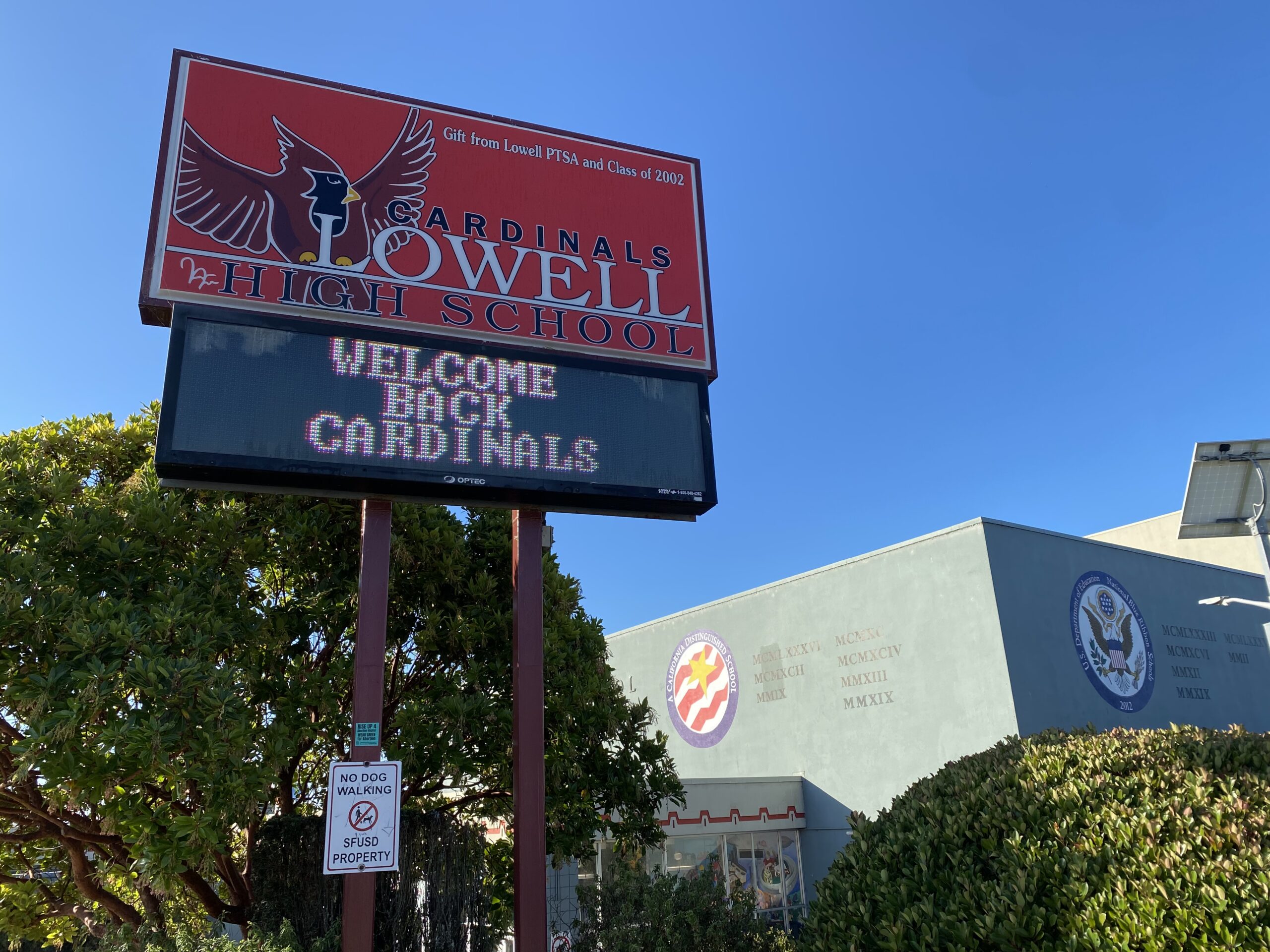A storm of controversy was ignited on June 22 this year when storied Lowell High School, overwhelmingly regarded as the most prestigious public high school in San Francisco, returned to a “merit-based” admission system after having been lottery-based for two years.
Since 1966, Lowell has had a long-standing tradition of using a competitive admissions process. Before October 2020, admission was based on tests and grades: middle school standardized test scores and GPA determined whether an applicant received a spot in the entering class. Sparked by pandemic-era testing difficulties, the school board voted to change Lowell admissions from this merit-based system to a lottery-based system in October 2020. This change became permanent in February 2021. Following the replacement of three San Francisco Unified School Board members one year later, a slim majority voted last June by four to three to return Lowell to the merit-based admission system for the 2023–2024 school year.
The controversy reflects a heated citywide debate about competing considerations in academic admissions, at various levels, pitting advocates of meritocracy against advocates of diversity and equity. This matter has also led to clashes and rising tensions between San Francisco’s Asian American community, which has been overwhelmingly in favor of the merit-based system, and the city’s African American community, which has taken the opposite position. San Francisco Board of Education President Jenny Lam stated that the controversy over the admissions system at Lowell “has torn this district, this city, apart.”
Proponents of the return to merit-based admissions say they want to maintain the highest academic standards, pointing to illustrious alumni such as the now-retired Supreme Court Justice Stephen Breyer. According to the Chinese Parent Advisory Council (CPAC) President Shurrin Zeng, “San Francisco needs a strong academically focused public high school.” In the movie “Try Harder,” director Debbie Lum followed five Lowell students over the 2017 school year, who shed light on their own experiences. They said, “When you first come in from middle school, you’ll want to cry … It’s really stressful … You aren’t as smart as you think you are … Lowell is the ultimate self-confidence crusher … Lowell is tiger mom central.”
Niche, a website which provides in-depth profiles of most schools and colleges in America, recently released their rankings for 2023. Lowell did not rank in the top 100 US high schools. In terms of state rankings, Lowell ranked 19th.
The main counterargument to this first reason is that extensive research shows high academic standards can be upheld without the merit-based admissions system. “No one is trying to dummy down Lowell,” said Linda Martley-Jordan of the Alliance of Black School Educators during a public comment, asserting that any argument to the contrary is harmful to students.
Former Lowell principal Joe Dominguez told the San Francisco Chronicle in email that “there are way too many variables that contributed” to the increase in D and F grades. Dominguez also added that, “Over a year of distance learning, half of our student body new to in-person instruction at the high school level, and absences among students/staff for COVID all explain this dip … It is important not to insinuate a cause on such a sensitive topic at the risk of shaming our students and teachers who have worked very hard in a difficult year.”
The second reason cited by merit-based system advocates is to serve the students generalized as “gifted or high academic achieving.” The opposing side sees this view as discriminatory against students historically excluded from this category. Opponents of merit-based systems point to numerous studies showing that students rise to the level of whatever expectations are set for them.
As Rev. Dr. Amos C. Brown, pastor of San Francisco’s Third Baptist Church since 1976, member of the National Board of Directors of the NAACP, leading civil rights advocate and former student of Dr. Martin Luther King, Jr. stated, “There should be equal opportunity … Let people prove themselves academically … What Lowell has done all these years is elitist and exclusionary. No test tells the capability of a child or student. There ought to be parity. People need to follow the golden rule and … do unto others as you would have them do unto you.”
SFSUD does not recognize Lowell as a specialized school. Terence Abad, executive director of the Lowell Alumni Association said, “Lowell is indeed a specialized academic magnet high school and should remain so. The school district seems to be changing their tune. In the past, the school district has used terms like specialized school to refer to Lowell. More recently they seem to have forgotten about that … and they call Lowell a regular high school. That’s a little bit odd given how they used to talk about Lowell.”
The third main reason presented in support of a merit-based admission system is that it provides the quality of a private education without the correspondingly high price tag. In June of this year, The Chronicle reported that, “Supporters of the merit system argued the city’s students need options, including an academically rigorous environment that offers a private school education at a free public school, and that admission should be based on hard work and academic achievement.” These supporters argue that Lowell has served as a kind of equalizer, granting equal opportunity to less affluent but studious and ambitious students who aspire to apply to competitive colleges, for which a degree from Lowell enhances their chances of admission. In March, The New Yorker magazine covered the new challenges and opportunities that Lowell faced after becoming open to all students. Nathan Heller wrote, “Lowell is one of the more middle class of the large San Francisco public high schools…It also has, by some measures, big coffers… Kids who applied because Lowell had a lot to offer take the A.P. courses, and the tests bring funding to make Lowell a school with a lot to offer. To the extent that the spiral makes Lowell competitive with private prep schools, it provides appealing access both for underprivileged families and for the middle class.”
Opponents of merit based admissions have pointed out that it is not SFUSD’s responsibility to provide this for students. When the school board voted on extending the lottery admissions system at Lowell this past June, Board Vice President Kevine Boggess voted in favor, while the community had a discussion on why the SFUSD has a school “that is considered superior to others.” Advocating for African American students, Rev. Brown said, “We need to help people, not judge them, not exclude them, and give them the resources they deserve to have in order to excel.”
Proponents counter this argument by highlighting the district’s failure to prepare students earlier for schools like Lowell. The San Francisco Standard, an independent news organization, wrote earlier this year that, “Supporters of criteria-based admissions argued Lowell was not at fault for district failures at the elementary and middle school level to prepare students for a rigorous environment, one that better sets up high-achieving students for success.”
Advocates of the lottery application process say that the principles of diversity and equity are advanced to an infinitely higher degree through a lottery-based system. The School Board voted in February 2021 to make the lottery system permanent, on the grounds that the merit-based system was elitist and discriminated against underrepresented African American and Latinx students. Rev. Brown emphasized that, “Black folks have had to fight injustice and racism since they were brought here as slaves.”
The opponents of a lottery-based system counter this justification by saying that from the perspective of the Asian American community, diversity is in fact being achieved, as Asian Americans are also “persons of color.” Abad pointed out that the merit-based system is equitable because, “It admits people under a set of criteria, regardless of where they went to middle school, regardless of their race or ethnicity … it’s race blind.”
Proponents of a lottery-based system disagree, pointing out that the current percentages of representation by ethnicity at Lowell are highly imbalanced and disproportional, with ethnic Asian American students constituting 49 percent and African American students only two percent. This is disproportionate relative to the overall population of the city, where Asian American residents comprise 34 percent and African American residents six percent.
The second reason cited by those in favor of a lottery-based admission system is that even though the merit-based system has been in place for many years, this system is a violation of the law — both in terms of the California Education Code and School Board policy.
California Education Code Section 35160.5(b)(2)(B) states that “selection of pupils to enroll in the school is made through a random, unbiased process that prohibits an evaluation of whether a pupil should be enrolled based upon the pupil’s academic or athletic performance.”
Karen Datangel, Public Relations Assistant for the SFUSD, confirmed in a September 21 email that, “Lowell is considered a comprehensive high school.” In other words, Lowell is a regular public high school, to which this code would presumably apply. Moreover, Board Policy 5120.1 states that, “The District and Lowell High School will recruit through groups and committees that serve our underrepresented students with the goal of increasing Lowell’s African American, Latin(x) and Pacific Islander students.”
Opponents of the lottery-based approach assert that laws can be interpreted one way or another. Essentially, this means that legal arguments could be devised to interpret these laws to allow for the continuation of merit-based admission to Lowell. Lottery proponents oppose this argument by saying that numerous legal experts and attorneys have stated that such interpretations are not based on solid legal reasoning.
The third reason commonly cited by advocates of a lottery-based system in support of their viewpoint is that the elimination of merit-based testing would be consistent with the larger educational trend away from standardized testing that preceded the pandemic. Colleges and local Bay Area private high schools have increasingly gone test-optional or decided to eliminate them altogether from their admissions process.
Opposers of the lottery initiative maintain the different view that numerous highly competitive colleges, such as the Ivy League schools, still consider standardized test scores, even though they add that this is done “holistically,” thereby validating their utility. Lottery supporters defend their stance by contending that the overwhelming evidence argues against the use of standardized test scores — Ivy League schools have even extended test-optional admissions policies for the upcoming admissions cycles.
Lick-Wilmerding High School, like the University of California system and other private independent high schools in the Bay Area, has moved to a test-free admissions policy. Director of Admissions Davion Fleming said, “I felt that after many years of working in admissions, standardized testing wasn’t the best indicator of whether or not a student would do well here.” He also noted that the school did research around this and learned that standardized testing “can be used as a way to bar or restrict access to students for any given institution.” LWHS has a holistic application process. Fleming advised that eliminating standardized testing “creates a more equitable process for folks.” It is expected that LWHS will remain test-free for the foreseeable future.
On September 20, the San Francisco Board of Education commissioners unanimously voted to approve the selection of Kelefors Education Partners, a San Francisco-based independent consulting firm, as the lead facilitator of the Superintendent Task Force. Many parents who spoke at the meeting voiced their concerns about the process and fee of $500,000. One of the four main reasons for the creation of the Task Force is a need for a review of admissions policies. Kelefores is tasked with examining admissions policies for both selective admissions and comprehensive high schools. The Task Force will exist for 12 months. Kelefors Educations Partners will work in conjunction with Partners in School Innovations, described as “a San Francisco-based non-profit committed to disrupting patterns of inequity in education,” and with Abl, “a San Francisco-based education improvement firm that uses unique data to help schools and district teams identify and address blind spots in their improvement strategies.” Kelefors must submit their final recommendations to Superintendent Matt Wayne by September 2023.
If California Education Code Section 35160.5(b)(2)(B) is followed, the likely outcome is that Lowell will return to a lottery-based admission system after the 2023-2024 school year. In 2018, Board of Education member Mark Sanchez told the San Francisco Chronicle, “What I understand is that we are probably in violation of [California Education Code Section 35160.5(b)(2)(B)].”
Mission Local, a bilingual local independent online news site, reported in February of this year that current and former Board of Education members noted that “the school district’s general counsel warned them, in closed-session meetings and in writing, that Lowell’s old merit-based admissions policy is incompatible with California law.” According to Mission Local, the district had considered consulting with the state attorney general, but did not to avoid a potential confirmation that the school was breaking the law. The school took the risk. Laura Dudnick, SFUSD Public Relations Manager wrote in a statement to Mission Local earlier this year that, “Any decision to either restore the Lowell Admissions Policy or to supersede it with another admissions policy must be consistent with the requirements of Education Code Section 35160.5(b)(2)(B), which explicitly prohibits public school districts from making enrollment decisions based on the student’s academic performance.” One thing is certain: the Lowell admissions controversy will almost surely continue into the foreseeable future.






